Don’t forget to scroll down to the very end. You can easily order any of these by using the link at the bottom that takes you to our secure order form page our the Hearts & Minds website. We are grateful for your business.
“Words can’t express,” says the wordy bookseller, who with his less talkative wife staked their livelihood on the power of written words. No, words can’t adequately express the gratitude we feel in reading the many words of encouragement folks shared on our Facebook accounts where we posted the link to the “Hearts & Minds 40th Anniversary” edition of BookNotes. Apparently people enjoyed reading about our 40 years as a bookstore. Lots ”liked” the column and many went to the effort of offering blessings. These days anyone who is a promoter of the printed page will be appreciated by book lovers, but this was really an extraordinary outpouring of support. We are profoundly grateful for each and every customer and friend.
That some said they’d renew their effort to get folks to send some business our way is a life-saver, too. As one person insisted years ago when we pondered closing up shop due to the financial stress, we are in this together. It sure felt that way this week. Thank you.
In that post there was a lot I didn’t say about our 40 years in the book biz and maybe throughout this year I might recall a few stories to give you a greater glimpse of the joys and sorrows these last decades as we tried to buck at least some of the trends in the industry. It has been interesting, trying to steward the insights and passions God has given us, curating a place that we thought would be helpful.
One thing I alluded to in that BookNotes piece was that we have sold a lot of different kinds of music here at the shop — records and cassettes, back in the day, and then CDs. I’m sad that the old sort of record store (like the one I worked in as a high-school kid, The Platter Palace in Hanover, PA, and then in their shop in downtown Gettysburg, PA) is even more rare than old-school bricks and mortar bookstores. Although quite specifically curated, mostly around our own interests and values, we had, without a doubt, the most diverse record department of any Christian bookstore in the country. From black gospel to ska, Christian metal to neo-folk protesters like Ani DeFranco and Billy Bragg, to remarkably talented bluegrass bands as well as classical and jazz, we had a lot.
Entire books have been written about the best (and worst) of the usually wholesome (and often serious) CCM performers like Amy Grant and Phil Keaggy, Jars of Clay and Switchfoot, and, say, the very cool, edgy bands like the 77s, The Choir, Chagall Guevara, etc. etc. and what for a while what was called “alternative” rock. We met Mark Heard a time or two, shared a stage once with Rich Mullins, and not too long ago hosted the great Michael Card. We had fun selling Celtic stuff, and lots of instrumental recordings — we stocked every album Windham Hill released, for instance, and hated calling it “new age.” We usually followed the Grammy Awards and stocked whatever classical albums were considered the best and similarly with jazz. Remember that minute when Benedictine chant was at the top of the charts? And, after all, shouldn’t every Christian bookstore carry Arvo Part?
There were Christian singer-songwriters who were in the mainstream and we appreciated them the most. Friends like Pierce Pettis and Brooks Williams were in the regular rotation. Mark Heard, naturally. T-Bone Burnett. Over the Rhine. Alice Cooper. (Yes, you read that right.) Sufjan Stevens, Brandi Carlile. We tired of the question “Is Kansas a Christian band?” and ” Why do you carry Earth, Wind, and Fire?” even though Philip Bailey was well known as a follower of Christ. Aretha’s album of hymns? Obviously. Bruce Cockburn was the best example of an outspoken Christian in the serious rock world, as were the Indigo Girls and Johnny Cash, and, at least for a while, Van Morrison. And, of course, U2. Praise Yahweh.
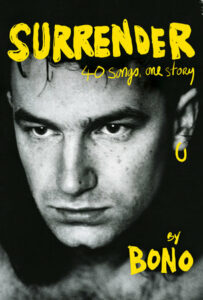 Although I listened mostly to Jackson Browne and Bill Mallonee (first as Vigilantes of Love and then as a brilliant an exceedingly prolific solo artist) I must admit that as I read Bono’s new memoir — Surrender: Forty Songs, One Story — I not only was delightfully brought through these last decades with renewed memories of the soundtracks for our lives but I was reminded just how much music means to me. As a guy in his late 60s I now savor silence more than I used to, but I am still grateful to my earliest friends who helped me grow beyond my passion for Simon and Garfunkel and Bob Dylan. I discovered James Taylor, Joni Mitchell, Dan Fogelberg, early Elton John, John Prine and Neil Young and, well, I was off the deep end smitten. Unlike some legalistic evangelicals, I did not burn my albums and was glad, years later, when guys from Grand Funk Railroad or America (not to mention Dylan) got born again. Bono, it seems, is not that different, coming of age in an era of punk with a dad who loved opera, drawn early to charismatic faith and tons of rock and roll, Irish soul, blues. Maybe you, too, will relate to this disaffected kid with anger issues who found meaning in the music, even if you weren’t a fan of Joey Ramone and The Clash.
Although I listened mostly to Jackson Browne and Bill Mallonee (first as Vigilantes of Love and then as a brilliant an exceedingly prolific solo artist) I must admit that as I read Bono’s new memoir — Surrender: Forty Songs, One Story — I not only was delightfully brought through these last decades with renewed memories of the soundtracks for our lives but I was reminded just how much music means to me. As a guy in his late 60s I now savor silence more than I used to, but I am still grateful to my earliest friends who helped me grow beyond my passion for Simon and Garfunkel and Bob Dylan. I discovered James Taylor, Joni Mitchell, Dan Fogelberg, early Elton John, John Prine and Neil Young and, well, I was off the deep end smitten. Unlike some legalistic evangelicals, I did not burn my albums and was glad, years later, when guys from Grand Funk Railroad or America (not to mention Dylan) got born again. Bono, it seems, is not that different, coming of age in an era of punk with a dad who loved opera, drawn early to charismatic faith and tons of rock and roll, Irish soul, blues. Maybe you, too, will relate to this disaffected kid with anger issues who found meaning in the music, even if you weren’t a fan of Joey Ramone and The Clash.
 Surrender: 40 Songs, One Story Bono (Knopf) $34.00 OUR SALE PRICE = $27.20
Surrender: 40 Songs, One Story Bono (Knopf) $34.00 OUR SALE PRICE = $27.20
Surrender: 40 Songs, One Story is one of the very best books I’ve read all year and it will certainly be in my personal favorites list coming up next month. In a way, it is a book of a lifetime for me. As a fan of U2, as a music-lover, as a uniquely Christian music-lover, this book resonated with me so very, very much. It brought stunning insight and joy; lots of joy. And, man, does Bono know his stuff. He knows so much stuff. Sure, he’s got the swagger, and he (as one reviewer noted, here “embraces his contradictions.”) But he really is smart. This book is an education in the popular culture of the last 40 years.
Let me just say four quick things about Surrender. I could, and surely should, wax more eloquent about it (it’s over 550 pages, after all) but I want to keep this succinct. I want you to know (if you don’t already) whether this book is for you.
(And then, I’ll list briefly 21 other fantastic books about music that we have sold over the years. The great books on this list, too, could be described in much greater detail, but I’ll be brief. Hopefully, just enough to entice you to order one or two, maybe as Christmas gifts. There are a lot of pop music fans out there, so check those out.)
Firstly, the book is not exactly linear and chronological (would you expect it to be?) but it mostly is. And there are song titles for chapter headings; naturally the first chapters are entitled from songs from their earliest recordings. (And the last few are, naturally, from their last albums; the important penultimate chapter is called “The Moment of Surrender” which you know from the No Line on the Horizon album.)
We learn from Mr. Paul Hewson in his own words a lot about his boyhood, the rough and rowdy ways of the religiously-conflicted Northern Ireland during the years of the troubles. With famous songs about “Sunday Bloody Sunday” outspoken pacifist tirades by the socially aware frontman of the social aware band, with nuanced lyrics recalling about how they cut down the few trees in their neighborhood and used them against their enemies (from “Peace on Earth” on All That You Can’t Leave Behind) I would have expected a bit more of the Troubles. Instead we hear about his love of bands, his school experiences, the impact of books he read, like Lord of the Flies, and — a theme throughout the whole book — the sudden death of his mother, Iris, when he was a young teen. So many of the lyrics of his long career, we come to find out, are veiled (or not so veiled) references to his mother and father. (As he sings in “Iris (Hold Me Close)” on Songs of Experience, “The ache in my heart is so much a part of who I am…”)
He’s a hurting punk and wanted to be a punk rocker, and man, I grew to love him more, learning a bit, in impressionistic style, about his youth and his longing for a more stable family.
He met his best friend, Ali, in his teen years in Dublin, Ali who became a girlfriend, who became his wife, early on. Again, this bit of his past is exceedingly important to him, enduring for him. My hunch is that many celebrities and certainly many rock stars are less connected to their youth, their past, their families. Or at least they think it isn’t cool to share that sort of sentimental family stuff. I loved that Bono has such affection for his dad (even if there was a lot of brokenness) and it was fun learning about Ali. It was fun learning about how he met the other three guys in the band and the importance of their friendships. His loyalty to these men is remarkable and in a way Surrender is a memoir of the trusting loyalty of these friendships.
I am a serious fan of the music, a real fan of Bono’s political action, and have admired his sly art as it transfigured and changed over the years. I really enjoy all of the albums and admire them all. (As we suspected, by the way, the changes were often very intentional; the Zoo-TV era antics of the Fly and the sensory overload of the shows were almost fully satire, some of it literally informed by C.S. Lewis’s Screwtape Letters, messing with the devil, their dangerously materialistic lifestyles mostly an embodied prophetic experiment.) So I know their work. But I have not read fan bios and knew very little about Bono’s family life. Maybe other fans knew about Ali and his children, but I think this is the most forthcoming he has been about them. There are beautiful pages, lovely episodes shared with many passages about the hard conflicts and honest struggles. Bono knows he has a very good woman by his side and he knows if he isn’t careful (as one of the most famous rock stars in the world) he could blow it. He almost did. But, man, his candor and poetic insight was some of the most romantic stuff I have read, ever. My hat is off and my heart is warmed.
Secondly, did I mention the music? I could quote pages and pages about this (and have sticky notes throughout the book in case I want to do a serious study.) He goes on tangents — not really tangents, just colorful side-journeys, into his friendships with other artists. From punk guys to Frank Sinatra, soul singers to new wave artists, from Prince to black gospel choirs, he tells endearing and sometimes heartbreaking tales of the many people he admires and loves. It is very obvious — he never speaks badly of anyone (except himself) and even when talking honestly about the horrors of drug or alcohol abuse (even Adam’s) he is not judgmental or mean-spirited. His generosity is lovely and his Irish storytelling — often of drinking late at night — is captivating. As a celebrity he knows he has been given quite remarkable opportunities, but he is also a gregarious bridge-builder and he knows more artists, working in different genres, than you could image.
He has encouraged many rising artists to apply their craft to anti-poverty and other justice measures; he tells of fashion designers, models, film-makers, poets, novelists, painters, dancers. Wow. Not bad from a kid from the Northside.
His story of how Pavarotti got him involved in relief work in Sarajevo is, by the way, hilarious. Annoying as it was, he applauded Pavarotti’s tenacity in pursuing him. “Miss Sarajevo” (from the pseudonymical “Passengers” album) remains one of Bono’s favorite pieces of his career. His moving reflections on Sinatra were powerful; his tribute to Michael Hutchence (of INXS) and his suicide was very tender.
Do you recall when a hard rock band was playing in Paris (in 2015) and a mass shooting killed dozens of audience members? U2 were doing a series of stadium shows also in Paris that week and their show was shut down — it wasn’t the only time Bono had experience a mass shooting, by the way. When they rescheduled the cancelled show they brought the smaller bar band — Eagles of Death Metal — onto their stage so they could finish their show that was so horrifically interrupted. These small stories of bands and stages and colleagues in the music biz were a blast to read and often inspiring.
And the recordings! I have read lots of books about rock music. Serious music lovers who read this sort of stuff may know know Greil Marcus’s magisterial work Mystery Train: Images of American in Rock ’n Roll Music or his book on Dylan and the Band’s “Basement Tapes” sessions (Old, Weird America.) And there are some really cool books on the details of certain recording sessions; I’ve read a few on the details of making of Abbey Road, for instance. Bono doesn’t give us that much of that sonic and technical detail, but there is plenty for even the most geeky fans of recording studios. Not to mention the small revelations of the band’s work with lighting artists and staging designers creating what have been some of the most outlandish, brilliant, and expensive stage shows in the rock touring world. This is all so interesting but it never turns self-indulgent, naming the obscure brands of tubes or speakers or the sorts of electronics in the amps. (Although it might be said that it is self-indulgent in a different way as he talks much about the personal stuff going on in the midst of these urgent sessions, squeezing in so much global activist between tours and recordings, struggles with his voice, and the constant guidance of producers like Brian Eno and Daniel Lanois.)
I love hearing bits about so many songs — his reflections nearer the end about writing songs about friendship (“Bad” for instance) or linking the famous “I Still Haven’t Found What I’m Looking For” to Bunyan’s Pilgrim’s Progress or how one song was co-written by Salman Rushdie. I was glad to hear about them holding their ground on changing the plans for a nice, spared-down, acoustic rendition of “Ordinary Love” (from the Mandela: Long Walk to Freedom Movie) for a live, Oscar show performance.
So there’s family stuff, friendships, relationships, old ones and new ones. There’s music, U2s and Bono’s numerous friendships with so many other rock artists. There’s great stuff on performing, on singing, or writing, or recording. If you like rock music (and especially if you like U2) this book is going to be a true joy.
Thirdly — and this is huge —there is a whole lot on politics. I found these portions hard to put down and as one who has engaged in a tiny, tiny bit of lobbying and protesting and building civic coalitions, I found this insider’s look to be a blast. Early on, Bono learned (from a story about Dr. King told to him by Harry Belefonte) to build bridges even with those one might not want to work with. There were times when Bono was deeply lobbying the Bush administration — with the Jubilee campaign to cancel the third world debt, with ONE and then with his DATA and (RED) to fund life-saving drugs against AIDS in Africa — and was becoming friends with those who others on his team (and in his band) found unsavory. Bush was bombing Iraq, of course, torturing Muslims in off-the-grid black sites, and cutting budgets for the poor in the US. Yet, as he endured, learning from all sides, he came to be convinced of some of the value of conservative economic theory and in his famous office visits to right-winger Jesse Helms even found a friendly prayer partner. I was on the edge of my seat as Bono had to make some decisions regarding the leader of the free world and consequential choices about aid and trade, war and peace. Interestingly, though not surprisingly, friends like the late Mike Gerson are named. What a thrill, knowing how it finally turned out.
From his meetings with Nelson Mandela (and other lesser known African leaders) to his off-the-record opening of his home to Mikhail Gorbachev (despite Ali’s outspoken work with anti-nuclear power activists resisting Russian malfeasance at Chernobyl) to his palling around with (and fallings asleep at) the Obama’s, it is very entertaining, although none of it feels like name-dropping. To listen in on one with such amazing global connections who was actually nervous about it all — imposter syndrome, don’t ya know — and his bits of candor about, say, fretting about what to wear when one is a rock star visiting the Oval Office, made for a great read. If you care at all about how the world works and how change happens, if you’ve donated money to ONE or (RED) or other similar anti-poverty groups, listening to Bono will be as inspiring as listening to the likes of Gary Haugen or Melinda Gates. He knows a lot about the facts of economic development and global politics and he weaves it into magical stories, often with stories of his on-the-ground, real-life volunteerism in poor villages. You’ll learn a lot.
Fourthly. I sort of hate to mention this final element as a discreet point since it is interwoven so naturally throughout the book, but it should be noted that Bono’s Christian faith — unorthodox and uneasy as it may seem to some — is central to the whole story. It is not just cited a little, it is not just mentioned briefly. There are Bible allusions and explications, basic theology, Christian authors mentioned, and spiritual realities talked about in significant ways during every portion of his life, so throughout the 40 chapters. (And you know, of course, that one of their most famous songs (”40”) is a nearly verbatim rendition of Psalm 40. Fans used to leave the stadium singing over and over “How long…”)
There is even a moving telling of the family’s deeply affecting religious tour of the Holy Land, which, for a glitzy rock star seems such a conventional, churchy practice. This is from the guy who says he “has never left Jesus out of the most banal or profane actions of my life.”
Most know how Bono’s father was a not terribly active Catholic and his mother was a good Protestant and how three of the band members came to a lively faith in a charismatic, Jesus-movement sort of evangelical ministry in their young adult years.They remained in touch with some of that crowd even after their faith moved to more ecumenical and liberationist ways and Bono continues to be haunted by that robust sense of the Spirit and that strong teaching of Biblical truth. For many of us, his casual, humorous, but serious-minded love/hate relationship with the church, is an inspiration. His honest lament and plea, of the sort found in “Wake Up Dead Man”, (from 1997’s Pop) means more than any number of happy-clappy CCM ditties. Through his fame and tenacity and righteous commitments Bono has had contact with world-class Christian leaders, from Desmond Tutu to Eugene Peterson to a hilarious episode that he writes about with Pope John Paul II. When he is visiting dignitaries he mentions that he sometimes gives away books— often a volume of Yeats or other Irish poetry. But I happen to know he’s given away his share of The Message, too. I admit to getting teary-eyed when I read his brief acknowledgment of Eugene Peterson.
Relationships, music, politics, faith. Stories galore, goodness and failure, temptation and joy, meaning and vision, art and wealth, compromise, justice, romance, sex, life and death. There is so much in this marvelous, stimulating book.
One final word: Surrender is creatively and colorfully written. Bono can really write; it is whimsical, a bit stream-of-consciousness, and, man, can he turn a phrase. There are witty lines on every page, brilliant sentences, wondrous prose. His clever honesty has him say things like about his ego being “far taller than my self-esteem.” Ha.
As the flyleaf of this well designed volume puts it,
A remarkable book by a combative artist, who finds he’s at his best when he learns how to surrender.
Episodic and irreverent, introspective and illuminating, Surrender is Bono’s life story, organized — but not too tidily — around forty U2 songs.
Scroll to the end of BookNotes to get to the ORDER link.
21 OTHER BOOKS TO READ ABOUT MUSIC – ALL 20% OFF
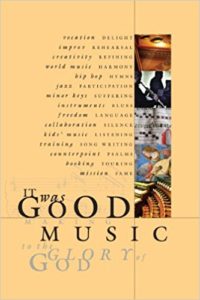 It Was Good: Making Music To the Glory of God edited by Ned Bustard (Square Halo Books) $24.99 OUR SALE PRICE = $19.99
It Was Good: Making Music To the Glory of God edited by Ned Bustard (Square Halo Books) $24.99 OUR SALE PRICE = $19.99
This is one of my all time favorite books, a diverse and splendid collection of pieces or various aspects of understanding, making, enjoying, and promoting music. 30 chapters from folks as diverse as Nashville singer-songwriter Sandra McCracken and Grammy winning jazzman John Patitucci and hipster Vito Aiuto; from Shai Linne to Keith Getty to Ruth Naomi Floyd to William Edgar, this is a great book.
Visit our archived BookNotes from a decade ago to see my long review of this wonderful resource, HERE.
 Kicking at the Darkness: Bruce Cockburn and the Christian Imagination Brian J. Walsh (Brazos Press) $22.00 OUR SALE PRICE – $17.60
Kicking at the Darkness: Bruce Cockburn and the Christian Imagination Brian J. Walsh (Brazos Press) $22.00 OUR SALE PRICE – $17.60
I cannot say what an honor it is to have a blurb on the back of this serious Biblically-informed study of Cockburn’s lyrics and the social imagination it alludes to. A brilliant analysis, a book to savor and ponder. This is how to do uniquely Christian criticism for the common good. I hope you know Walsh’s many books (most recently, Romans Disarmed, co-written with his wife, Sylvia Keesmaat, an exceptionally poetic and respected Biblical scholar.) And, yes, this line is from the Cockburn song (“Lovers in a Dangerous Time”) that Bono himself wrote about discovering in his classic song on Rattle and Hum, “God Part II”. You know what, though? Even if you don’t care for U2 and don’t know much about Cockburn, this is a great study for Christians in the arts, for those wanting to learn how to do a close reading of contemporary lyrics, of one guys illuminating study of one artist’s creative formation of a social imagination. It’s a great, great book, despite the rare picture of Bruce with a rather rare haircut.
I did a two part BookNotes exploration of this book when it came out, so you can check that out if your interested. Start HERE.
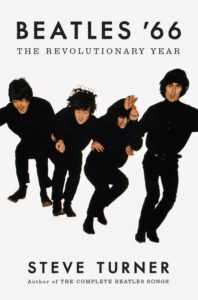 Beatles ’66: The Revolutionary Year Steve Turner (Ecco) $16.99 OUR SALE PRICE = $13.59
Beatles ’66: The Revolutionary Year Steve Turner (Ecco) $16.99 OUR SALE PRICE = $13.59
I have written often about my friend Steve Turner (whose Imagine: A Vision for Christians in the Arts is a must-read for anyone wanting a helpful Christian framework for thinking about the popular arts, and whose Pop Cultured: Thinking Christianly about Style, Media and Entertainment is absolutely essential for thinking about film, TV, fashion, comedy, video games, advertising, photography, celebrity, and such.)
This grand book is one of several on the Beatles written by this this esteemed rock critic (Turner really is one of the top five or six rock critics in the world, who has met and most likely interviewed almost every important rock star of the last 50 or more years.) Here he makes the case that 1966 was the crucial year, as Barry Miles, biographer of Paul McCartney, put it, “in the Beatles amazing journey from being the Fab Four to becoming the princes of psychedelia.” Who knew that so much happened in so short a time? Turner is truly one of the most prominent music journalists and rock critics and he knows as much about the Beatle’s as anyone writing today. This is a great read, lots of fun about the entire British pop culture scene and about the lads from Liverpool.
Reading Beatles ’66, I’m right there — and where else would you want to be if you love music?” Bono
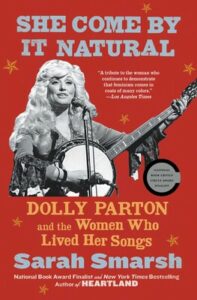 She Come By It Natural: Dolly Parton and the Women Who Lived Her Songs Sarah Smarsh (Scribner) $16.00 OUR SALE PRICE = $12.80
She Come By It Natural: Dolly Parton and the Women Who Lived Her Songs Sarah Smarsh (Scribner) $16.00 OUR SALE PRICE = $12.80
This was a National Book Critics Circle Award Finalist and one of Time’s “must read books of 2020.” I agree, and raved about it in BookNotes back when it was still in hardcover. You may know Sarah Smarsh, a journalist who has reported from and about the hardships of rural life, mostly in the Midwest, and whose first book, Heartland: A Memoir of Working Hard and Being Broke in the Richest Country on Earth, was nothing short of brilliant. We of course still stock it.
She Come By It Natural started out as a four-part long-form essay in the Americana/roots journal No Depression and was expanded her into a book, “anointing Parton as a badly needed beacon: in a divided country, she remains that rare someone who everyone can love” Yet, as a blue-collar, Midwest feminist, Smarsh shares much about gender, class, and culture through Dolly’s trailblazing life and songs. You learn about Dolly, her hard-scrapple life in Appalachia, her music, and how Smarsh’s own people drew courage and joy from it all. I loved this book.
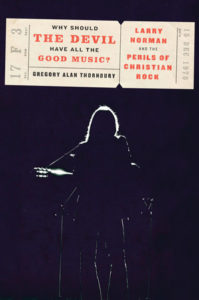 Why Should the Devil Have All the Good Music: Larry Norman and the Perils of Christian Rock Gregory Alan Thornbury (Convergent) $26.00 OUR SALE PRICE = $20.80
Why Should the Devil Have All the Good Music: Larry Norman and the Perils of Christian Rock Gregory Alan Thornbury (Convergent) $26.00 OUR SALE PRICE = $20.80
I could go one and on (and I did in a BookNotes review a few years ago when this book was brand new) just describing how many great writers, thinkers, artists, and theologians have raved about this book. Yes, from scholar Charles Marsh to activist David Dark to artist Dan Haseline (of Jars of Clay) who calls it “required reading” so many have shared their joy and appreciation. There are curious blurbs on the back from various sorts, including Black Francis (lead singer of The Pixies) and singer-songwriter Alison Moore, who affirms the book’s “delicious detail.”
Larry Norman was obviously very, very important as an artists of the Jesus Movement and influential and the way he did and did not reflect the ways of CCM. I believe it is vital to understand. It is the definitive book on Larry Norman and his era and we very highly recommend it. Kudos to Gregory Thornbury, a rebellious evangelical thinker and wild-child not unlike Larry himself. Kudos.
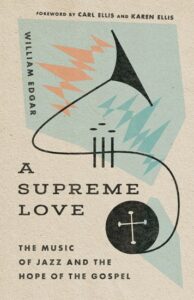 A Supreme Love: the Music of Jazz and the Hope of the Gospel William Edgar (IVP) $24.00 OUR SALE PRICE = $19.20
A Supreme Love: the Music of Jazz and the Hope of the Gospel William Edgar (IVP) $24.00 OUR SALE PRICE = $19.20
We have raved in these pages about many of the books by Dr. William Edgar, a professor of cultural apologetics at Westminster Theological Seminary. Many know that Bill —then a sharp, young Harvard kid — found evangelical faith while visiting Francis Schaeffer in the early 1970s. (His book on Schaeffer, Schaeffer on the Christian Life: Countercultural Spirituality, tells some of that story and is excellent.)
In this recent work Edgar shares so much about the gospel roots of jazz, the Christian theological underpinnings of much black music, and the way in which jazz can express so much about life, even the uniquely Christian life. (He has written a magnum opus on culture-making, released a few years ago, Created and Creating: A Biblical Theology of Culture.) In this one, he really shines, sharing insights he has been developing for decades, even as he as performed live pieces on solo piano and with jazz bands for years. There are blurbs here by important, theological voices (like Charlie Peacock, Calvin Seerveld, and Jeremy Begbie) but the short foreword by Carl Ellis and Karen Ellis, thoughtful black leaders in the PCA church, is itself nearly worth the price of the book.
As Bill says, this book is a labor of love. We highly recommend it, especially if you want to know more about Miles Davis, Duke Ellington, Jon Coltrane, Ellas Fitzgerald and Louis Armstrong.
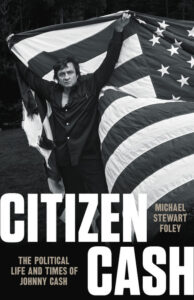 Citizen Cash: The Political Life and Times of Johnny Cash Michael Stewart Foley (Basic Books) $32.00 OUR SALE PRICE = $25.60
Citizen Cash: The Political Life and Times of Johnny Cash Michael Stewart Foley (Basic Books) $32.00 OUR SALE PRICE = $25.60
Wow. For starters I might mention that in a chapter in Surrender, Bono says much about his affection for Johnny and June. (And says that Cash’s dinner grace was the most beautiful such prayer he’s ever heard.) If you are a U2 fan, you should care about Johnny Cash.
I suppose I should say that the authorized biography of Johnny Cash is by the aforementioned Steve Turner, The Man Called Cash: The Life, Love and Faith of an American Legend; if you know anyone who is a fan, it is a must; now in paperback.
But this new one by Michael Stewart Foley? Oh my —what a book! It is what documentary filmmaker Ken Burns calls “an important reassessment of one of American music’s greatest performers.” This remarkable book is about Johnny and his times; it is about his “deep reserves of empathy and insight” which made him an artist for his times. And ours, eh?
Beth Bailey says that “Foley beautifully combines historical biography with his knowledge of Cash’s music and its context. This is a masterful work.”
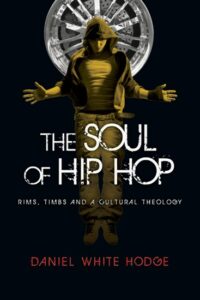 The Soul of Hip Hop: Rims, Timbs and a Cultural Theology Daniel White Hodge (IVP) $26.00 OUR SALE PRICE = $20.80
The Soul of Hip Hop: Rims, Timbs and a Cultural Theology Daniel White Hodge (IVP) $26.00 OUR SALE PRICE = $20.80
There are several good books offering a distinctively Christian approach to hip hop and rap, and, for my money, this is the best. Prof. Daniel Hodge has written a lot (and edited The Journal of Hip Hop Studies.) We’ve got several of his (see his stunning Homeland Insecurity: A Hip Hop Missiology for the Post-Civil Rights Context that I cautiously raved about here when it first came out) and by other authors, as well. The Soul of Hip Hop remains the very best starter book — a gem. And don’t miss the chapter on Tupac.
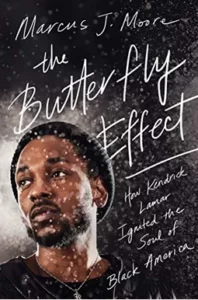
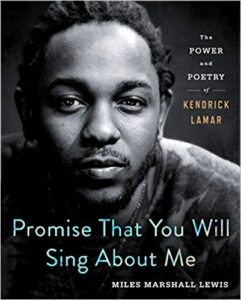 For what it is worth, if one wants to look at the much-discussed work of rapper Kendrick Lamar (who has won 13 Grammys) see the searing cultural biography, The Butterfly Effect: How Kendrick Lamar Ignited the Soul of Black America by Marcus J. Moore (Atria Press; $17.00 – OUR SALE PRICE = $13.60.) Also, we have a fabulously cool and very creative coffee table book with art entitled Promise That You Will Sing About Me: The Power and Poetry of Kendrick Lamar by Miles Marshall Lewis (St. Martin’s Press; $29.99 – OUR SALE PRICE = $23.99.) Both are important, I’d say.
For what it is worth, if one wants to look at the much-discussed work of rapper Kendrick Lamar (who has won 13 Grammys) see the searing cultural biography, The Butterfly Effect: How Kendrick Lamar Ignited the Soul of Black America by Marcus J. Moore (Atria Press; $17.00 – OUR SALE PRICE = $13.60.) Also, we have a fabulously cool and very creative coffee table book with art entitled Promise That You Will Sing About Me: The Power and Poetry of Kendrick Lamar by Miles Marshall Lewis (St. Martin’s Press; $29.99 – OUR SALE PRICE = $23.99.) Both are important, I’d say.
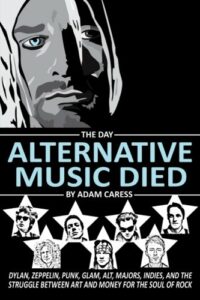 The Day Alternative Music Died: Dylan, Zeppelin, Punk, Glam, Alt, Majors, Indies, and the Struggle Between Art and Money for the Soul of Rock Adam Caress (New Troy Books) $16.99 OUR SALE PRICE = $13.59
The Day Alternative Music Died: Dylan, Zeppelin, Punk, Glam, Alt, Majors, Indies, and the Struggle Between Art and Money for the Soul of Rock Adam Caress (New Troy Books) $16.99 OUR SALE PRICE = $13.59
Oh my — this. This is a book I’ve adored, promoted, highlighted, and exclaimed about, not only because it is so enjoyable (for rock music fans) but because it is so important, a massive case study of a major question for anyone thinking well about the arts — namely, the interface of art and business, creativity and making a living. Or, as the author put it, “the blatant commercialization and homogenization of alternative music” in the 1990s. As Adam shows with such great and enjoyable detail, there has always been a ping-ponging across the abyss as “rock music’s pendulum has been swinging back and forth between artistic and commercial aspirations.” He starts the story with a fabulous bit of insight into the rise of critical rock journalism inspired, he claims, by the early work of Bob Dylan. He gets to Nirvana, of course, but has to draw some good background.
This is the complex story of those tensions “grafting the untold and vital story of the rise and fall of the alternative music scene of the 1980s and 90s into a larger rock music narrative that spans half a century, shedding light on a number of crucial developments in rock and popular music.”
Go to our website to find my 2015 review of this if you want more details. I discussed it with great passion and and detail.
Adam Caress has worked in the music industry as a performer, recording artist, even a booking agent. He has been employed at Montreat College, a Christian college in Montreat, NC and now teaches at Middle Tennessee State University. This is a great read, highly recommended.
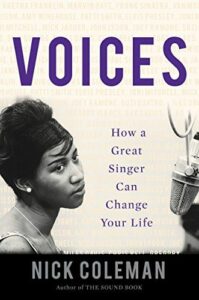 Voices: How a Great Singer Can Change Your Life Nick Coleman (Counterpoint) $26.00 OUR SALE PRICE = $20.80
Voices: How a Great Singer Can Change Your Life Nick Coleman (Counterpoint) $26.00 OUR SALE PRICE = $20.80
When Roddy Doyle (of The Commitments) says a book is “exciting” you know it must be. Whew.
Each chapter in this amazing work explores various singers that the author (himself a music critic) enjoys. That he is moved by and finds, even, transformational. Or what we used to call “mind-blowing.”
From the early rock and rollers like Little Richard, Jerry Lee Lewis, Chuck Berry, and Elvis, he moves to the girl groups (The Ronettes, The Marvelettes, and the Shangri-La’s.) His chapter on vulnerable singers looks at Marvin Gaye and Roy Robinson. I adored his chapter (the first I read, actually) on Joni Mitchell called “An Urge for Going” (which also looked at Jackson Browne, Paul Simon, Rickie Lee Jones, and Steely Dan.) You’ve got to read his “Class Acts” which, while looking at everybody from The Kinks and Bowie, mostly focus on Lennon and Jagger.
You get the picture — this good work is a study about “hearing voices.” What book has a great chapter on soul and then looks at crooners as diverse as Sinatra and Kate Bush and Luther Vandross (and Iggy Pop, believe it or not!)
The chapter “Psalms and Raptures’ explores Van Morrison, Burning Spear, and more (with a bit on Bob Dylan) and the “spectacle of anguish” looks at Janis Joplin, Billie Holiday, and Amy Winehouse and more. His groupings of singers is fascinating and I learned (and came to appreciate) a lot. You will, too.
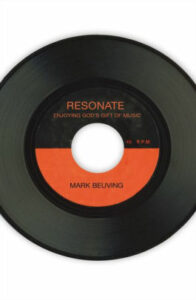 Resonate: Enjoying God’s Gift of Music Mark Beuving (Zondervan) $16.99 OUR SALE PRICE = $13.59
Resonate: Enjoying God’s Gift of Music Mark Beuving (Zondervan) $16.99 OUR SALE PRICE = $13.59
I was going to list this one first as it nicely sets the stage for so much of what seems behind all of these suggestions, at least for many BookNotes readers. That is, it’s no secret that some Christians (many of us, maybe) are somewhat ambivalent about so-called secular popular music. (Not to mention our concerns about music in the church.) This nice, Biblically-based book offers what is said to be a “wise and winsome approach.” Resonate invites us to recapture the wonder and value of this legitimate aspect of living in God’s good creation.
I might be a bit more illuminated by themes of “common grace” and want to affirm more about seemingly secular music, but this author isn’t bad on that. He is sure that pop music is often an “unappreciated gift” and here he gives a careful, Christian apologetic to rock on. Nicely done.
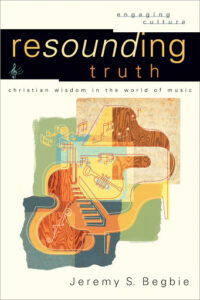 Resounding Truth: Christian Wisdom in the World of Music Jeremy S. Begbie (Baker Academic) $35.00 OUR SALE PRICE = $28.00
Resounding Truth: Christian Wisdom in the World of Music Jeremy S. Begbie (Baker Academic) $35.00 OUR SALE PRICE = $28.00
This is major book in the esteemed “Culture Matters” series and is the creme de le creme when it comes to thoughtfully written, deeply foundational books on the meaning of music. Begbie, influenced as a young classical music conductor and composer by Calvin Seerveld, has gone on to become the premier theological writer about aesthetics and, more generally, about Christian views of the arts. We have most of his weighty works (and know another one called Abundantly More: The Theological Promise of the Arts in a Reductionist World is coming in 2023.)
Resounding Truth, on music, is the best book of its kind. A must for music majors, classical music aficionados, and anyone wanting a deep rumination on the way music matters in God’s good world. I love the play on words, resounding Truth or Re-sounding truth.
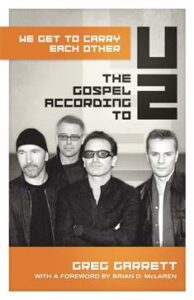 We Get To Carry Each Other: The Gospel According to U2 Greg Garett (WJK) $20.00 OUR SALE PRICE = $16.00
We Get To Carry Each Other: The Gospel According to U2 Greg Garett (WJK) $20.00 OUR SALE PRICE = $16.00
There are several Christian reflections on the life and work and lyrics of U2 and this is doubtlessly one of the best. Garrett is an English prof at Baylor, a film critic and novelist. This book has been called “smart, sincere, and serious.”
The book is arranged in three major sections — Belief, Communion, and Justice. And there is a nifty conclusion, “Ten Spiritual Lessons from U2” followed by some good remarks on No Line on the Horizon. Very nicely done. By the way, for an excellent early exploration see the lovely classic by Irishman Steve Stockman, Walk On: The Spiritual Journey of U2.
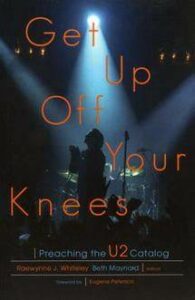 Get Up Off Your Knees: Preaching the U2 Catalog edited by Raewynne Whiteley & Beth Maynard (Cowley) $14.95 OUR SALE PRICE = $11.96
Get Up Off Your Knees: Preaching the U2 Catalog edited by Raewynne Whiteley & Beth Maynard (Cowley) $14.95 OUR SALE PRICE = $11.96
I used to recommend this book often, reviewed it here years ago, and now realize it is so very, very good, I wanted to link it to the career-spanning memoir, Surrender: 40 Songs, One Story. This is a great collection of sermons based on U2 texts. Two things had to be in place for these chapters to be considered: they really did have to be engaged with the lyrics of a specific U2 song and they had to have been really preached. It ends up being an international and intergenerational collection of gospel-centered preaching and U2 exploration. What a book.
I have to say that two of my favorite friends — Steve Garber and Brian Walsh — each have two excellently powerful chapters in here. They are, I might add, among the very best in the book. Yes!
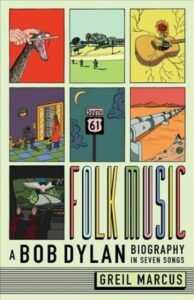 Folk Music: A Bob Dylan Biography in Seven Songs Greil Marcus (Yale University Press) $27.50 OUR SALE PRICE = $22.00
Folk Music: A Bob Dylan Biography in Seven Songs Greil Marcus (Yale University Press) $27.50 OUR SALE PRICE = $22.00
I have only started this so can’t speak in detail, but I’ll say this: Marcus loves the long, complex sentences. He is a scholar and a long-standing fan. This is not his first book on Dylan and he is notable, even in scholarly circles, as a “supreme artist-critic.”
As one reviewer put it, “Decade after decade, Greil Marcus has proven himself to be not only a brilliant cultural critic about music, lives, and stories that have helped shape contemporary American consciousness, he has also done much to articulate why our music has always stood at the axis of sound and politics.” He writes with someone called “critical exuberance.”
His intro shares about how at first he didn’t like “Blowin’ in the Wind.” (He later wrote a lovely introduction to the power of the song for a kids book, believe it or not.) But then, well…
This may be unsurpassed; it is amazing about Dylan, but not really a biography; he opens with a brief bit about the difficulties of the very notion of biography. Of course he does.
Here is Greil Marcus at his most brilliantly insightful, eloquent, persuasive, brimming with information about Bob Dylan and his music, unique in his ability to combine the most candid sort of memoirist prose with truly inspired commentary. As Dylan ‘sees himself’ in his subjects, so Greil Marcus ‘sees himself’ in Dylan, the most original musical genius of our time, the perfect subject for the most original music critic of our time. –Joyce Carol Oates
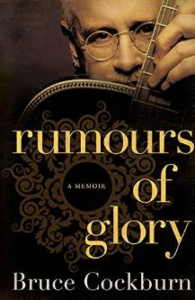 Rumors of Glory: A Memoir Bruce Cockburn (HarperOne) $28.99 OUR SALE PRICE = $23.19
Rumors of Glory: A Memoir Bruce Cockburn (HarperOne) $28.99 OUR SALE PRICE = $23.19
I have made it clear that I really appreciate — adore! — the many albums of Bruce Cockburn. I reviewed this long memoir in a BookNotes post when it first came out and I can’t say how much I still value this amazing story.
That Jackson Browne has a blurb on the back (calling it “the story of the development of one of the most astute and compelling songwriters in the English language”) is beyond cool. Lewis Hyde, the philosopher of the arts known for the generative book The Gift, which inspired a favorite song by Cockburn, says it is “a finely grained account of the ground from which he harvested one of the finest songs of his generation.”
Cockburn tells a good story about life and faith and beauty and justice. There are things in here that wonderfully struck me, some sad stuff, some insights about his writing and record, politics and advocacy. I’m grateful for such autobiographical accounts and this is one I’ve really enjoyed. How could I not?
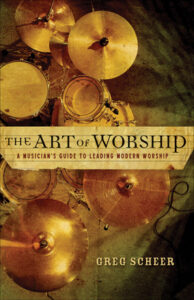 The Art of Worship: A Musicians Guide to Leading Modern Worship Greg Scheer (Baker) $18.00 OUR SALE PRICE = $14.40
The Art of Worship: A Musicians Guide to Leading Modern Worship Greg Scheer (Baker) $18.00 OUR SALE PRICE = $14.40
I could listen 20 great books about worship and a lot about the role of music in worship — we have our favorites. I wanted to have a least one on this list be about church music and this one is a true gem. Whether your church tilts contemporary or traditional (or what some call blended), Scheer is going to be an ally and help. It is (in the words of John Witvliet from the Calvin Institute on Christian Worship) “a very practical nuts and bolts of contemporary worship music leadership that will challenge both new and veteran leaders to rethinking their approach to a host of practical challenges.” Greg is a fine composer and liturgist, rooted well in the solid theology of the broad, historic church, but has lead contemporary praise services as well. His reminder that the congregations voice is central is an important insight and he is adept at offering Biblical principles and action steps, theological soundings and good stories. Nicely done.
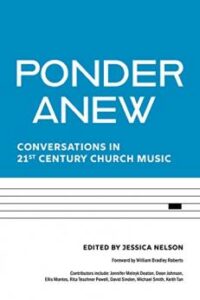 Ponder Anew: Conversations in 21st Century Church Music edited by Jessica Nelson (Church Publishing) $19.95 OUR SALE PRICE = $15.96
Ponder Anew: Conversations in 21st Century Church Music edited by Jessica Nelson (Church Publishing) $19.95 OUR SALE PRICE = $15.96
I haven’t read this yet but this very new book from the Episcopal publishing house looks great — consider Ponder Anew. There’s some good folks included — choirmasters, liturgists, organists, a campus minister from Harvard, and several directors of music including one from a prominent church in White Marsh, outside of Philadelphia, where we have been.) This looks like a fabulous collection.
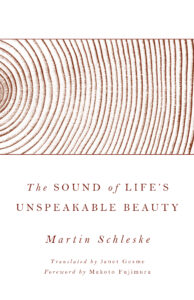 The Sound of Life’s Unspeakable Beauty Martin Schleske, translated by Janet Gesme (Eerdmans) $25.99 OUR SALE PRICE = $20.79
The Sound of Life’s Unspeakable Beauty Martin Schleske, translated by Janet Gesme (Eerdmans) $25.99 OUR SALE PRICE = $20.79
I have raved about this at BookNotes before and can’t say enough about the mature eloquence and deep charm of this wonderful book by a German luthier. It is about wood and nature, about work and craft, about music and joy, about faith and beauty. Schleske’s thoughtful theology of creative beauty discerned through his own work making violins and cellos and guitars is translated beautifully by classical musician Janet Gesme — and celebrated with a robust forward by abstract painter and culture-care advocate Makoto Fujimura.
This heavy, well made book — with some artful black and white photos — was one of our very top books just a few years ago and I couldn’t let this list on pop music pass without reminding our friends of the exceptional quality of his remarkable work.
Reading these richly evocative reflections, I found myself again and again ‘surprised by joy.’ And gratitude. I was reminded that when people live into their callings deeply and faithfully, they become beacons: they remind us what happens when one says yes to the Spirit’s invitation daily and faithfully. Stories from Schleske’s work as a violinmaker, his knowledge of trees and music and even varnish, become heart-opening parables, not by preachment, but by the loving particularity with which he pays attention to the work he was given. — Marilyn McEntyre, author of Caring for Words in a Culture of Lies and When Poets Pray
I have never seen someone so passionately and comprehensively express the relationship between calling and faith. Page by page, Schleske offers lessons along his violinmaking journey that are sure to inspire his readers. His book compels me to join him as a friend and fellow traveler, walking in the woods with him as he shares his beautiful insights. Schleske is the teacher. I am the student. And in the end, I find in the book a sense of hopefulness about the world in which we journey. — Tony Payne, Wheaton College
TO PLACE AN ORDER
PLEASE READ AND THEN CLICK ON THE “ORDER HERE” LINK BELOW.
It is very helpful if you tell us how you prefer us to ship your orders.
The weight and destination of your package varies but you can use this as a general guide:
There are generally two kinds of US Mail options, and, of course, UPS. If necessary, we can do overnight and other expedited methods, too. Just ask.
- United States Postal Service has the option called “Media Mail” which is cheapest but can be slow. For one typical book, usually, it’s about $3.69; 2 lbs would be $4.36.
- United States Postal Service has another option called “Priority Mail” which is $8.50, now, if it fits in a flat rate envelope. Many children’s books and some Bibles are oversized so that might take the next size up which is $9.20. “Priority Mail” gets much more attention than does “Media Mail” and is often just a few days to anywhere in the US.
- UPS Ground is reliable but varies by weight and distance and may take longer than USPS. We’re happy to figure out your options for you once we know what you want.
If you just want to say “cheapest” that is fine. If you are eager and don’t want the slowest method, do say so. It really helps us serve you well so let us know.
– DON’T FORGET TO LET US KNOW WHAT SHIPPING METHOD YOU PREFER –
BookNotes
SPECIAL
DISCOUNT
20% OFF
ALL BOOKS MENTIONED
+++
order here
this takes you to the secure Hearts & Minds order form page
just tell us what you want to order
inquire here
if you have questions or need more information
just ask us what you want to know
Hearts & Minds 234 East Main Street Dallastown PA 17313
read@heartsandmindsbooks.com
717-246-3333
No, Covid is not fully over. Since nobody is reporting their illnesses anymore, it is tricky to know the reality but the best measurement is to check the water tables to see the amount of virus in the eco-system. And it’s still bad. And with new stuff spreading, many hospitals are really overwhelmed. It’s important to be particularly aware of how risks we take might effect the public good. It is complicated for us, so we are still closed for in-store browsing due to our commitment to public health (and the safety of our family, staff, and customers.) The vaccination rate here in York County is sadly lower than average. Our store is a bit cramped without top-notch ventilation so we are trying to be wise. Thanks for understanding.
Please, wherever you are, do your best to be sensitive to those who are most at risk. Many of our friends, neighbors, co-workers, congregants, and family members may need to be protected since more than half of Americans (it seems) have medical reasons to worry about longer hazards from even seemingly mild Covid infections.
We are doing our famous curb-side and back yard customer service and can show any number of items to you if you call us from our back parking lot. It’s sort of fun, actually. We are eager to serve and grateful for your patience as we all work to mitigate the pandemic. We are very happy to help do if you are in the area, do stop by.
Of course, we’re happy to ship books anywhere. Just tell us how you want them sent.
We are here 10:00 – 6:00 EST / Monday – Saturday, closed on Sunday.

